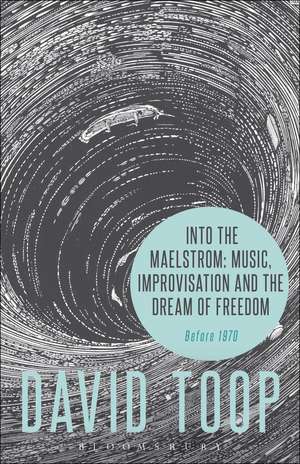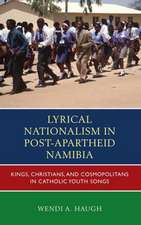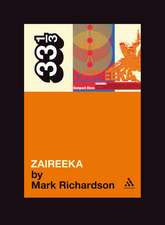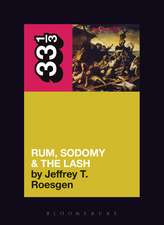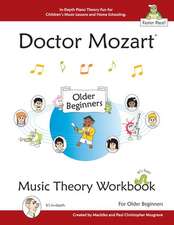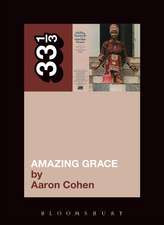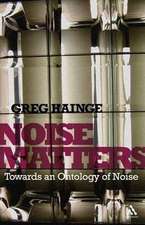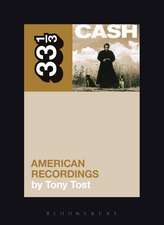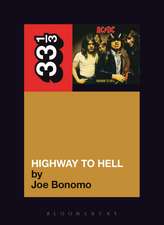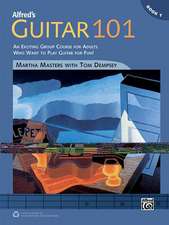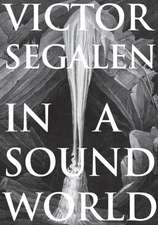Into the Maelstrom: Music, Improvisation and the Dream of Freedom: Before 1970
Autor David Toopen Limba Engleză Paperback – 4 mai 2016
| Toate formatele și edițiile | Preț | Express |
|---|---|---|
| Paperback (1) | 167.71 lei 22-36 zile | +44.77 lei 5-11 zile |
| Bloomsbury Publishing – 4 mai 2016 | 167.71 lei 22-36 zile | +44.77 lei 5-11 zile |
| Hardback (1) | 569.60 lei 43-57 zile | |
| Bloomsbury Publishing – 4 mai 2016 | 569.60 lei 43-57 zile |
Preț: 167.71 lei
Preț vechi: 193.54 lei
-13% Nou
Puncte Express: 252
Preț estimativ în valută:
32.10€ • 34.88$ • 26.98£
32.10€ • 34.88$ • 26.98£
Carte disponibilă
Livrare economică 31 martie-14 aprilie
Livrare express 14-20 martie pentru 54.76 lei
Preluare comenzi: 021 569.72.76
Specificații
ISBN-13: 9781628927696
ISBN-10: 1628927690
Pagini: 336
Dimensiuni: 140 x 216 x 23 mm
Greutate: 0.43 kg
Editura: Bloomsbury Publishing
Colecția Bloomsbury Academic
Locul publicării:New York, United States
ISBN-10: 1628927690
Pagini: 336
Dimensiuni: 140 x 216 x 23 mm
Greutate: 0.43 kg
Editura: Bloomsbury Publishing
Colecția Bloomsbury Academic
Locul publicării:New York, United States
Caracteristici
A multidisciplinary approach to the history and development of free-improvisation with discussions of political influence, art movements (surrealist automatism, stream-of-consciousness in literature), etc.
Notă biografică
David Toop is a writer, musician and curator. His books include Ocean of Sound, Haunted Weather and Sinister Resonance. He is Professor of Audio Culture and Improvisation at University of the Arts London, UK.
Cuprins
1: (only begin) A DESCENT2: FREE BODIES3: collective subjectivities 14: OVERTURE TO DAWN5: collective subjectivities 26: INTO THE HOT7: solitary subjectivities8: TROUBLED SEA OF NOISES AND HOARSE DISPUTES9: collective objectivities10: IMAGINARY BIRDS SAID TO LIVE IN PARADISE11: postscript: the ballad of john and yoko12: RAIN FALLING DOWN ON OLD GODSIndex
Recenzii
[A] discursive and consistently stimulating account.
Maelstrom indeed ... [This] is an encyclopedic vortex of musicology, memoir and speculative extemporisation on the nature of improvisation and freedom in music ... crammed with detail and fascinating observations ... A captivating reading experience that perfectly embodies its subject in form.
David [Toop] has browsed through history and offers readers an extremely rich overview of myriad germs of improvisation popping up all over the world, in so many musics, in fine arts and theater, in politics and philosophy, in social activism, and in small musical events. ... [T]his panoramic book is an absolute must-read for everyone interested in (the archeology of) free improvisation, actually for anyone interested in music in general. I am already looking forward to the second volume.
A typically multi-faceted and prismatic look at improvisation, written from the perspective of a practitioner. Turns out exploring free improvisation in music is really about exploring life.
This is a long overdue book, and there is no-one else who could have written it. It is an astonishing achievement, and a highly readable and enjoyable one too.
Toop spends much of his latest effort exploring the philosophical and artistic movements from which pre-1970 performers drew inspiration ... In this, [Into the Maelstrom] provides a fascinating view of 20th century underground movements well beyond that of music alone.
There is a wide range of substantive material here for both scholars and fans of the music ... If one accomplishment of the work must be singled out, it is that it assumes no foreknowledge of improvised music, and yet it would enrich the understanding of anyone who considers themselves an expert on the subject.
Any discussion of free improvisation, as an essential (anti?)-discipline of creative music, is an amusing balance between considering an unruly child and a sacred cow. History has come into a wild favor towards a genre that perpetually defies definition and prediction. David Toop, with a critical facility informed by over forty years of activity on and off the bandstand, sets his ruminations in the service of the music. Essaying on free improvisation in the mode of composition can result in didactic chin scratch. Thankfully Toop engages the readers interest with a sentient breath of prose charged by academic insight where poetic space becomes the page. It's only the beginning.
Toop's latest opus explores in depth the various traces of improvisation in music and elsewhere ... It is a broad panorama of portraits, reflections, anecdotes, evocations, miscellaneous quotations, interview extracts and questions on the nature and the development of the concepts of spontaneity and free expression throughout the twentieth century.
The range of artists that are written about in this book is absolutely amazing. The beautiful thing is Toop was also in the height of the scene during the 1960s - so his views are both personal as well as a history of music being made and recorded throughout the 20th century. ... Toop has an encyclopedic knowledge of literature and music. What makes him a great writer is that he is able to use those tools to tell a remarkable narrative ... Perfect book.
Describing the world as increasingly policed and regulated, Toop argues that people have come to devalue the role of improvisation in human behavior. Although the focus of Into the Maelstrom is music, Toop also examines theater, film, and the visual arts along with sociologists such as W. E. B. Du Bois. He explores a wide variety of musical styles and practitioners, including jazz musicians Sidney Bechet, Ornette Coleman, and the AACM; composers such as Luciano Berio, John Cage, Edgard Varèse, and Percy Grainger; and the rock band Pink Floyd. Toop also acknowledges the role of technology in music and improvisation-as exemplified by, for example, composer/performing artist Pauline Oliveros. The interesting discography will be a useful resource. Summing Up: Recommended. Upper-division undergraduates through faculty and professionals.
David Toop has dived into the Maelstrom that is the genesis of improvised music and come up with a string of pearls. There is so much here that will be new to even those of us who thought we knew the subject. A remarkable piece of real scholarship that relies on painstaking research with a refreshing absence of jargon.
Into the Maelstrom gives an astonishing, vivid history of improvised music across the 20th century before 1970, tracing its transnational criss-crossings, trans-arts contagions, the folds between Cream and AMM, 'musicking' and John Stevens' Spontaneous Music Ensemble, Nuova Consonanza and For a Few Dollars More. David Toop's panoramic account makes obvious how urgently we have needed this alternative history, attuned to musical sounds as they resonate with artistic, cultural and political currents. A landmark book, Into the Maelstrom re-centres those vast and auspicious margins deserted by previous music histories.
Maelstrom indeed ... [This] is an encyclopedic vortex of musicology, memoir and speculative extemporisation on the nature of improvisation and freedom in music ... crammed with detail and fascinating observations ... A captivating reading experience that perfectly embodies its subject in form.
David [Toop] has browsed through history and offers readers an extremely rich overview of myriad germs of improvisation popping up all over the world, in so many musics, in fine arts and theater, in politics and philosophy, in social activism, and in small musical events. ... [T]his panoramic book is an absolute must-read for everyone interested in (the archeology of) free improvisation, actually for anyone interested in music in general. I am already looking forward to the second volume.
A typically multi-faceted and prismatic look at improvisation, written from the perspective of a practitioner. Turns out exploring free improvisation in music is really about exploring life.
This is a long overdue book, and there is no-one else who could have written it. It is an astonishing achievement, and a highly readable and enjoyable one too.
Toop spends much of his latest effort exploring the philosophical and artistic movements from which pre-1970 performers drew inspiration ... In this, [Into the Maelstrom] provides a fascinating view of 20th century underground movements well beyond that of music alone.
There is a wide range of substantive material here for both scholars and fans of the music ... If one accomplishment of the work must be singled out, it is that it assumes no foreknowledge of improvised music, and yet it would enrich the understanding of anyone who considers themselves an expert on the subject.
Any discussion of free improvisation, as an essential (anti?)-discipline of creative music, is an amusing balance between considering an unruly child and a sacred cow. History has come into a wild favor towards a genre that perpetually defies definition and prediction. David Toop, with a critical facility informed by over forty years of activity on and off the bandstand, sets his ruminations in the service of the music. Essaying on free improvisation in the mode of composition can result in didactic chin scratch. Thankfully Toop engages the readers interest with a sentient breath of prose charged by academic insight where poetic space becomes the page. It's only the beginning.
Toop's latest opus explores in depth the various traces of improvisation in music and elsewhere ... It is a broad panorama of portraits, reflections, anecdotes, evocations, miscellaneous quotations, interview extracts and questions on the nature and the development of the concepts of spontaneity and free expression throughout the twentieth century.
The range of artists that are written about in this book is absolutely amazing. The beautiful thing is Toop was also in the height of the scene during the 1960s - so his views are both personal as well as a history of music being made and recorded throughout the 20th century. ... Toop has an encyclopedic knowledge of literature and music. What makes him a great writer is that he is able to use those tools to tell a remarkable narrative ... Perfect book.
Describing the world as increasingly policed and regulated, Toop argues that people have come to devalue the role of improvisation in human behavior. Although the focus of Into the Maelstrom is music, Toop also examines theater, film, and the visual arts along with sociologists such as W. E. B. Du Bois. He explores a wide variety of musical styles and practitioners, including jazz musicians Sidney Bechet, Ornette Coleman, and the AACM; composers such as Luciano Berio, John Cage, Edgard Varèse, and Percy Grainger; and the rock band Pink Floyd. Toop also acknowledges the role of technology in music and improvisation-as exemplified by, for example, composer/performing artist Pauline Oliveros. The interesting discography will be a useful resource. Summing Up: Recommended. Upper-division undergraduates through faculty and professionals.
David Toop has dived into the Maelstrom that is the genesis of improvised music and come up with a string of pearls. There is so much here that will be new to even those of us who thought we knew the subject. A remarkable piece of real scholarship that relies on painstaking research with a refreshing absence of jargon.
Into the Maelstrom gives an astonishing, vivid history of improvised music across the 20th century before 1970, tracing its transnational criss-crossings, trans-arts contagions, the folds between Cream and AMM, 'musicking' and John Stevens' Spontaneous Music Ensemble, Nuova Consonanza and For a Few Dollars More. David Toop's panoramic account makes obvious how urgently we have needed this alternative history, attuned to musical sounds as they resonate with artistic, cultural and political currents. A landmark book, Into the Maelstrom re-centres those vast and auspicious margins deserted by previous music histories.
